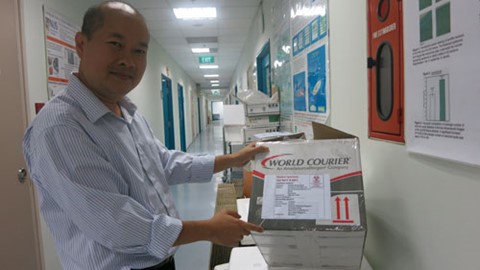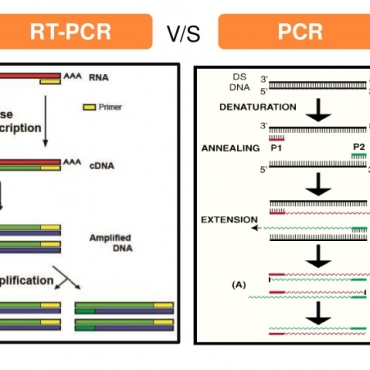Contact Admission
International Collaboration
World umbilical cord in Vietnamese hands
By detecting stem cells in the umbilical cord membrane of newborns in 2004, Dr. Phan Toan Thang is now mastering related medical technologies around the world.

Associate Professor Phan Toan Thang inside the umbilical cord sample containers
Send courier from around the world to Singapore
to check the quality first - Photo: Thuc Minh
Global commercialization of the umbilical cord
Unlike the discovery of TBG in the cord blood of American scientists without patent rights, the invention of Dr. Phan Toan Thang is a great scientific achievement, publicized by the World Intellectual Property Organization (WIPO). patented in 2005. Therefore, anyone can do it by storing umbilical cord blood; while the storage of the umbilical cord has been thrown away, copyrighted by the inventor company CellResearchCorp.
Up to now, Mr. Thang's invention has been copyrighted in 20 countries and territories with advanced science in the world such as the US, EU, UK, Israel, Russia, China, India, Australia. .. "It took nearly 3 million USD for that piece of paper", Mr. Thang said happily to Thanh Nien reporter about the cost and effort of nearly ten years to obtain copyright certificates of so many countries.
In return, his work has been commercialized globally with the CellResearchCorp Company valued at over $ 500 million. Currently, many companies around the world have purchased copyright from CellResearchCorp to store the umbilical cord. StemCyte was founded by Taiwan-American doctor Robert Chow and purchased exclusive umbilical cord storage in North America, Mexico and Taiwan. "Because the US area is too large, maybe we will sell the archival rights to two more companies", said Associate Professor Phan Toan Thang. Meanwhile, in Asia, Singapore's Cordlife Group Limited exclusively purchases umbilical cord storage in Singapore, Hong Kong, India, Indonesia and the Philippines; Malaysia's StemLife Berhad has already conducted storage in Malaysia and is expanding through Thailand. In China alone, China Cord Blood Corporation is an exclusive company and currently has up to 3 storage banks in Beijing, Guangdong and Zhejiang. Also in Vietnam, MekoStem, founded by Associate Professor Phan Toan Thang and the country's leading scientists in 2009, is the world's first bank that stores both blood and cord membranes.
Global quality control
Not only selling archival rights, CellResearchCorp of Associate Professor Phan Toan Thang is also responsible for checking the quality of each umbilical cord stored in the world. In addition to Vietnam, the US and China have on-site equipment to check the TBG quantity and quality of each stored product under the support of CellResearchCorp specialists, other facilities around the world send product samples to Singapore to check. "For some companies, taking samples and sending them to our lab once a month has higher economic efficiency, instead of having to spend a lot of capital to invest in equipment", Mr. Thang said. He also added that China alone must have a regulation that does not allow the Chinese umbilical stem sample to be taken out of its borders.
Currently, the cost of storing an 18-year umbilical cord in Singapore is SGD 7,000 (about VND 116 million), equivalent to the price in Hong Kong. And in countries like India, Indonesia, Vietnam ... the price is about 2,000 USD. After 18 years, the child is then the adult age and has the right to decide about his umbilical cord. If you want to keep it, the contract will be signed again and the owner is the old baby, Mr. Thang explained.
So far, after a few years of starting to store, almost no baby has had to take out his umbilical cord to treat the disease, except for a few cases used to treat his grandparents in China. , Mr. Thang said. However, the need for umbilical cord storage is on the rise in economically affluent families. In Singapore, Cordlife's facility in the Yishun industrial park currently holds about 2,000 units. Each month, this place receives about 200 units, a number according to Mr. Thang is "significant" compared to the population of just over 5 million people and the birth rate of women in this country is only 1.19 children / woman. . Meanwhile, Cordlife's facility in Kolkata (India) stores up to 1,200 units per month.
|
Keep the "race" of the Xi Jinping family Associate Professor Phan Toan Thang said: In 2011, Hiu Ng's niece, Xi's sister's son, was about to give birth to her first child. Once studying abroad and married to an Englishman, she heard about the technology of the umbilical cord membrane and had aspirations to store the umbilical cord for her child. Mr. Xi, then vice president of the country, asked the Ministry of Health of China to find out and learned that the author of this invention was a Vietnamese living in Singapore. Through discussions with the Singapore Ministry of Health, the Chinese side invited Associate Professor Phan Toan Thang to Beijing to handle the umbilical cord storage. On August 1, 2014, President Xi's granddaughter continued to give birth to a second child. At this time, the storage facility of China Cord Blood Corporation was formed, but Associate Professor Phan Toan Thang continued to be invited to Beijing to support processing. |
Other research
- PHAN ASIA UNIVERSITY OPEN EXPENSES RESEARCH COOPERATION WITH PASTEUR LILLE INSTITUTE- FRANCE ( 08:51 - 05/03/2020 )
- USTIN, Texas - Researchers from the University of Texas at Austin and the National Institutes of Health made a major breakthrough to the development of new coronavirus vaccines in 2019 by creating a scale map First 3D atom of a tuber part ( 11:18 - 22/02/2020 )
- Importation and Human-to-Human Transmission of a Novel Coronavirus in Vietnam ( 14:57 - 31/01/2020 )
- PCR test in medical diagnosis ( 10:03 - 16/11/2019 )
- Announcement: Organizing Clinical Microbiology course ( 07:53 - 09/04/2019 )
- AI is so powerful that it can predict the moment of human death ( 08:42 - 01/04/2019 )
- Stem cell magic ( 15:14 - 30/03/2019 )
- A new breakthrough in stem cell research ( 09:20 - 30/03/2019 )
- Treatment of psoriasis ( 09:38 - 23/03/2018 )


















